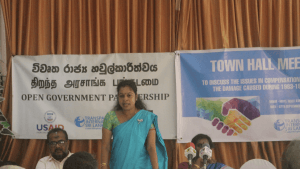Sri Lanka – Citizens Use the RTI Law to Retrieve Government Compensation
Sri Lanka – Ciudadanos que usan la ley de derecho a la información para recibir compensación del gobierno
After decades of failed initiatives to promote the right to informationThe legal right to request information from the government allows the public to follow government decision-making, participate in ensuring better decisions, and hold the government accountable. Techni..., Sri Lanka finally enacted its Right to Information Act (RTI) in 2016. The law allows Sri Lankans to scrutinize their government more closely, more effectively participate in decision-making, and exercise active citizenship beyond electionsImproving transparency in elections and maintaining the independence of electoral commissions is vital for promoting trust in the electoral system, preventing electoral fraud, and upholding the democr... More.
Implementation of the new law had significant impact across Sri Lanka, particularly in Koomankulam, a village located in the Northern Province of the country. After the Sri Lankan civil war ended in 2009, villagers struggled to rebuild their lives. To provide relief, the government announced villagers could apply for compensation. As villagers submitted their applications, they either received letters promising to pay a certain sum or nothing at all from the government. However, things started to change in 2016. Citizens began to hear about passage of the RTI law and its implementation through OGP. Leveraging the new law, villagers began inquiring about the status of their compensation by appealing to their designated officer. The day after the appeal, one villager received a portion of their compensation. The next day more villagers started getting money deposited in their accounts. After fighting for years, the villagers of Koomankulam finally began to get the justiceTo address barriers that prevent citizens from having their justice needs met, OGP participating governments are working to expand transparency, accountability, and inclusion into all systems of justi... they had fought so long for.
To increase citizens’ knowledge of the new law across the country, the Sri Lankan government launched awareness campaigns, targeting social welfare recipients and women, and began broadcasting a weekly television program that discusses key RTI cases, activists and their accomplishments, and current debates surrounding the new legislationCreating and passing legislation is one of the most effective ways of ensuring open government reforms have long-lasting effects on government practices. Technical specifications: Act of creating or r.... The campaign aims to strengthen the enforceable right to information and empower citizens to exercise it. Information officers and the country’s RTI Commission are acting to ensure that citizens can lodge requests for information and that the government fulfills those requests.
Like the villagers from Koomankulam, citizens across Sri Lanka have already used RTI to change their daily lives and their communities and hold government officials accountable.
Photo Credit: TransparencyAccording to OGP’s Articles of Governance, transparency occurs when “government-held information (including on activities and decisions) is open, comprehensive, timely, freely available to the pub... More International Sri Lanka
Tras décadas de iniciativas fallidas para promover el derecho a la información, Sri Lanka finalmente publicó su ley de derecho a la información en 2016. Esta ley permite a la ciudadanía de Sri Lanka vigilar a sus gobiernos más de cerca, participar en la toma de decisiones y ejercer sus derechos cívicos más allá de las elecciones.
La implementación de la nueva ley tuvo impactos significativos en Sri Lanka, sobre todo en Koomankulam, localidad ubicada en la provincia del norte del país. Tras la guerra civil de Sri Lanka que terminó en 2009, los pobladores enfrentaban una serie de dificultades. En ese contexto, el gobierno anunció que los pobladores podían solicitar compensaciones, pero cuando enviaban sus solicitudes, los pobladores recibían cartas del gobierno con promesas de que recibirían cierta suma o simplemente no recibirían nada. Sin embargo, la situación empezó a cambiar en 2016 cuando la ciudadanía empezó a tener noticias sobre la publicación de la ley de acceso a la información y de su implementación a través de OGP. Aprovechando el contexto de la nueva ley, los pobladores empezaron a plantear preguntas sobre el estado de su compensación a través de apelaciones dirigidas al funcionario asignado. Un día tras haber enviado su apelación, un poblador recibió una parte de su compensación. Al día siguiente, más pobladores empezaron a recibir recursos en sus cuentas. Tras luchar durante años, los pobladores Koomankulam finalmente empezaron a recibir la justicia que habían exigido durante años.
Con el fin de incrementar el conocimiento sobre la nueva ley en la ciudadanía de todo el país, el Gobierno de Sri Lanka implementó campañas de sensibilización dirigidas a los beneficiarios de los programas sociales y a las mujeres y, cada semana, transmitió programas de televisión en los que hablaba sobre casos relacionados con el derecho a la información, algunos activistas y sus logros y sobre temas relacionados con la nueva legislación. El objetivo de la campaña es fortalecer el derecho de información y empoderar a los ciudadanos para ejercerlo. Los funcionarios de información del país y la Comisión de acceso a la información de Sri Lanka están trabajando para asegurar que los ciudadanos puedan presentar solicitudes de información y que el gobierno responda a dichas solicitudes.
Como los pobladores de Koomankulam, la ciudadanía de todo el país ya está empezando a utilizar el derecho a la información para cambiar sus vidas y sus comunidades y exigir que sus gobiernos rindan cuentas.
Crédito: Transparency International Sri Lanka


Leave a Reply